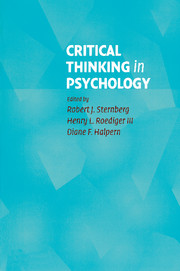Book contents
- Frontmatter
- Contents
- List of Illustrations and Tables
- List of Contributors
- Preface
- 1 The Nature and Nurture of Critical Thinking
- 2 Evaluating Experimental Research
- 3 Critical Thinking in Quasi-Experimentation
- 4 Evaluating Surveys and Questionnaires
- 5 Critical Thinking in Designing and Analyzing Research
- 6 The Case Study Perspective on Psychological Research
- 7 Informal Logical Fallacies
- 8 Designing Studies to Avoid Confounds
- 9 Evaluating Theories
- 10 Not All Experiments Are Created Equal
- 11 Making Claims in Papers and Talks
- 12 Critical Thinking in Clinical Inference
- 13 Evaluating Parapsychological Claims
- 14 Why Would Anyone Do or Believe Such a Thing?
- 15 The Belief Machine
- 16 Critical Thinking and Ethics in Psychology
- 17 Critical Thinking in Psychology
- Author Index
- Subject Index
- References
17 - Critical Thinking in Psychology
It Really Is Critical
Published online by Cambridge University Press: 05 June 2012
- Frontmatter
- Contents
- List of Illustrations and Tables
- List of Contributors
- Preface
- 1 The Nature and Nurture of Critical Thinking
- 2 Evaluating Experimental Research
- 3 Critical Thinking in Quasi-Experimentation
- 4 Evaluating Surveys and Questionnaires
- 5 Critical Thinking in Designing and Analyzing Research
- 6 The Case Study Perspective on Psychological Research
- 7 Informal Logical Fallacies
- 8 Designing Studies to Avoid Confounds
- 9 Evaluating Theories
- 10 Not All Experiments Are Created Equal
- 11 Making Claims in Papers and Talks
- 12 Critical Thinking in Clinical Inference
- 13 Evaluating Parapsychological Claims
- 14 Why Would Anyone Do or Believe Such a Thing?
- 15 The Belief Machine
- 16 Critical Thinking and Ethics in Psychology
- 17 Critical Thinking in Psychology
- Author Index
- Subject Index
- References
Summary
In this book, distinguished theorists and researchers in psychology have explored the role of critical thinking in psychology. The conclusion I come to is that critical thinking is critical in and to psychology. In this final chapter, I summarize some of the “critical” lessons readers can learn from having read the book.
HOW YOU SAY IT IS OFTEN AT LEAST AS IMPORTANT AS WHAT YOU SAY
Our parents socialize us into the importance of putting things in a positive and constructive way, and of saying things in the “right” way. These skills should be part of our socialization in psychology as well. For example, Halpern (Chapter 1, this volume) points out that although two questions – “Do you favor or oppose allowing students and parents to choose a private school to attend at public expense?” and “Do you favor or oppose allowing students and parents to choose any school, public or private, to attend using public funds?” – essentially ask the same thing, the percentages of respondents responding in favor of vouchers differed by 22%, depending on how the question was asked. Similarly, Schwarz (Chapter 4, this volume) shows that how survey questions are framed has an enormous impact on how they are answered. Even using a scale of −5 to +5 versus 0 to 10 had a large impact – a difference of 21% – in the way a question about success in life was answered.
- Type
- Chapter
- Information
- Critical Thinking in Psychology , pp. 289 - 296Publisher: Cambridge University PressPrint publication year: 2006



